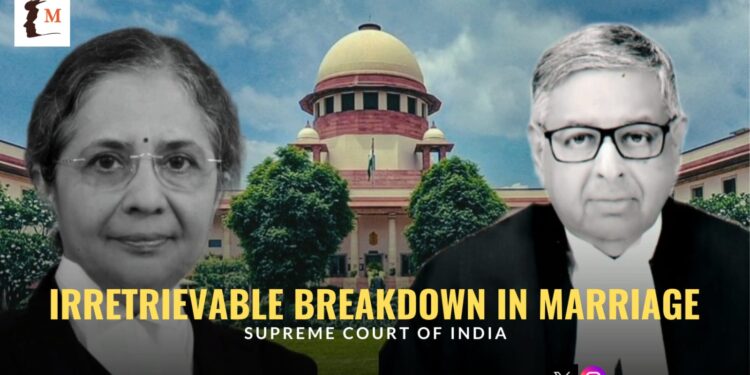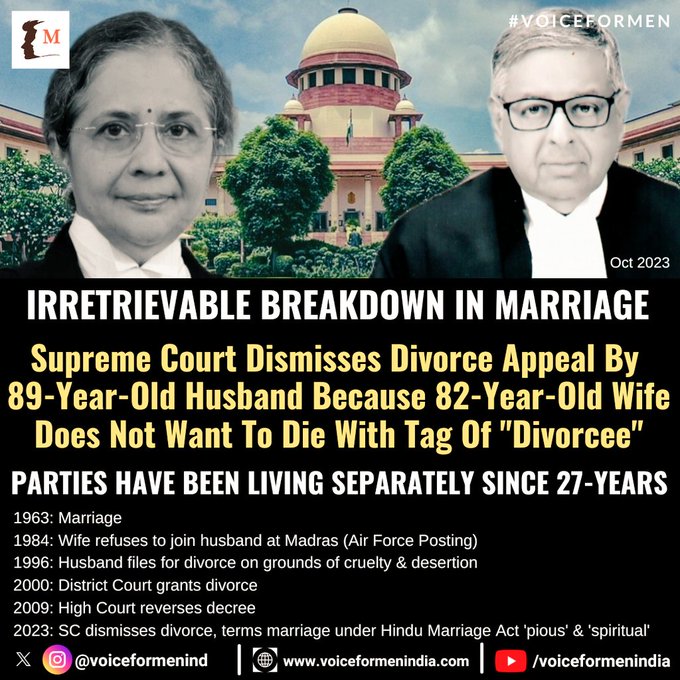The Supreme Court in its judgment dated October 10, 2023 dismissed a divorce appeal by an octogenarian husband and refused to dissolve a marriage on grounds of irretrievable breakdown, observing that the Court must exercise its inherent powers under Article 142 of the Constitution of India such with great care and caution.
This is a very unique case where the husband is 89-years-old and the wife is 82-years-old. Parties have been living separately for 27-years.
READ ORDER | Hindu Marriage Act Does Not Recognise Irretrievable Breakdown In Marriage As Grounds For Divorce Leaving Parties To Suffer: Delhi High Court
Case:
The couple got married as per the Sikh rites in March 1963 at Amritsar. Parties have three children– two daughters (both married now), and one son.
The appellant-husband is a qualified doctor, and was Commissioned Air Force Officer. He retired in April 1990 as Wing Commander. The respondent-wife is also a qualified teacher, who was working in a Central School, and has retired now.
The appellant had filed the Divorce proceedings in March 1996 before the District Court, Chandigarh on two grounds, namely ‘cruelty’ and ‘desertion’ as contemplated in Section 13(1)(ia) and 13(1)(ib) respectively of the Hindu Marriage Act 1955.
District Court, Chandigarh
In February 2000, the District Court granted the decree of divorce in favour of the husband.
Punjab & Haryana High Court
In February 2009, a Single Bench of the High Court reversed the same and the Division Bench of the High Court confirmed the judgment and order passed by the Single Bench. This order was challenged by the husband in Supreme Court.
READ ORDER | Continued Bitterness, Dead Emotions & Long Separation To Be Construed As Irretrievable Breakdown In Marriage: Supreme Court
Submissions by Husband
As per the case of the appellant, he was serving in the Indian army and the respondent was serving as a teacher in Central School in Amritsar. Till January 1984, the relations between the parties were normal. The acrimony in their relationship developed when the appellant was posted at Madras in January 1984 and the and the respondent did not join him, and preferred to stay initially with the parents of the appellant and thereafter with her son. Despite sincere efforts having been made by the parties, the differences and disputes could not be resolved, which ultimately led the appellant to file Divorce proceedings in the District Court.
The counsel for the husband submitted that the parties are staying separately since the time the appellant had filed the Divorce petition in the District Court (March 1996), and that the marriage having been irretrievably broken down, thus, the Court should exercise its powers under Article 142 of the Constitution of India and grant a decree of divorce. In this regard, he has heavily relied upon the recent decision of the Constitution Bench in the case of Shilpa Sailesh vs. Varun Sreenivasan.
Defense by Wife
The learned advocate for the respondent submitted that the wife being an aged lady does not want to die with the stigma of a “Divorcee.” According to her, the respondent had made all efforts to respect the sacred relationship between the parties all through out and is still ready to look after the appellant with the assistance of her son.
Mere long period of separation could not tantamount to irretrievable breakdown of the marriage. She lastly submitted that the appellant having failed to make out any ground either of cruelty or desertion, the Court may not interfere with the concurrent findings recorded by the Single Bench and the Division Bench of the High Court in this regard.
Rakesh Raman Vs Kavita | Supreme Court Landmark Judgement | Irretrievable Breakdown Of Marriage Can Be Read As Grounds Of Cruelty To Grant Divorce
Supreme Court of India
A bench of Justice Aniruddha Bose and Justice Bela M Trivedi went through the files on record and clarified:
The institution of marriage is considered to be a ‘pious’ and ‘spiritual’ union in Indian society, a strait-jacket formula for the grant of relief of divorce under Article 142 on the ground of ‘irretrievable break down of marriage’ may not be desirable.
In our opinion, one should not be oblivious to the fact that the institution of marriage occupies an important place and plays an important role in the society. Despite the increasing trend of filing the Divorce proceedings in the courts of law, the institution of marriage is still considered to be a pious, spiritual, and invaluable emotional life-net between the husband and the wife in the Indian society.
It is governed not only by the letters of law but by the social norms as well. So many other relationships stem from and thrive on the matrimonial relationships in the society. Therefore, it would not be desirable to accept the formula of “irretrievable break down of marriage” as a strait-jacket formula for the grant of relief of divorce under Article 142 of the Constitution of India.
With regards to the 82-year-old wife’s submission of taking care of her 89-year-old husband with the aid of her son, the top court said:
The respondent all throughout her life has maintained the sacred relationship since 1963 and has taken care of her three children all these years, despite the fact that the appellant-husband had exhibited total hostility towards them.
The respondent is still ready and willing to take care of her husband and does not wish to leave him alone at this stage of life. She has also expressed her sentiments that she does not want to die with the stigma of being a “divorcee” woman.
In contemporary society, it may not constitute to be stigma but here we are concerned with the respondent’s own sentiment.
Dismissing the appeal by the husband, the Supreme Court said that allowing divorce in such a situation would cause injustice to the wife. The bench concluded:
Under the circumstances, considering and respecting the sentiments of the respondent wife, the Court is of the opinion that exercising the discretion in favour of the appellant under Article 142 by dissolving the marriage between parties on the ground that the marriage has irretrievably broken down, would not be doing “complete justice” to the parties, would rather be doing injustice to the respondent.
No Proposal To Allow Both Parties File For Divorce On Grounds Of “Irretrievable Breakdown” Of Marriage | Modi Government
Voice For Men India Take:
- Supreme Court of India decriminalised adultery in 2018
- But when it comes to granting contested divorce where parties have been separated for 27-years, the top court terms institution of marriage pious and spiritual in India society
- Hindu Marriage Act, 1955 is one of the most inhuman and cruel act towards the spouse who wants an exit from a dead and abusive marriage
- In fact, these archaic laws only aide the spouse who wants to trap the other for life, in the name of customs and traditions
- If divorce under Hindu Marriage Act is virtually impossible, then divorce laws under this Act should be completely scrapped, so that both parties can live separately exercising their fundamental human right and not waste years and decades at court paying money to lawyers, only to face rejection in the name of customs and society in the end
- If you read up some of our other articles on the link here with regards to irretrievable breakdown in marriage, you will understand how each case is at the mercy of the ideology and values followed by a respective judge or the bench
- While the older generation has suffered immensely due to harassment by disgruntled spouses, the new generation today will revolt against all such laws or completely get disillusioned with the union of marriage, that chokes them for life in the name of justice
- Remember all these cases, next time your cheer for your country India, having its divorce rate at 1%
DO WATCH:
Irretrievable Breakdown of Marriage A Ground To Dissolve Marriage Under Article 142 | Supreme Court
(Shilpa Sailesh vs. Varun Sreenivasan)
LEAVE YOUR COMMENTS BELOW:
READ ORDER | Supreme Court Dismisses Divorce Appeal By 89YR Husband Separated Since 27YRS
— Voice For Men India (@voiceformenind) October 12, 2023
1963: Marriage
1996: Husband files divorce
2000: Court grants divorce
2009: HC reverses decree
2023: SC dismisses divorce as wife doesn't want to die with tag of 'divorcee'…
Join our Facebook Group or follow us on social media by clicking on the icons below
If you find value in our work, you may choose to donate to Voice For Men Foundation via Milaap OR via UPI: voiceformenindia@hdfcbank (80G tax exemption applicable)































